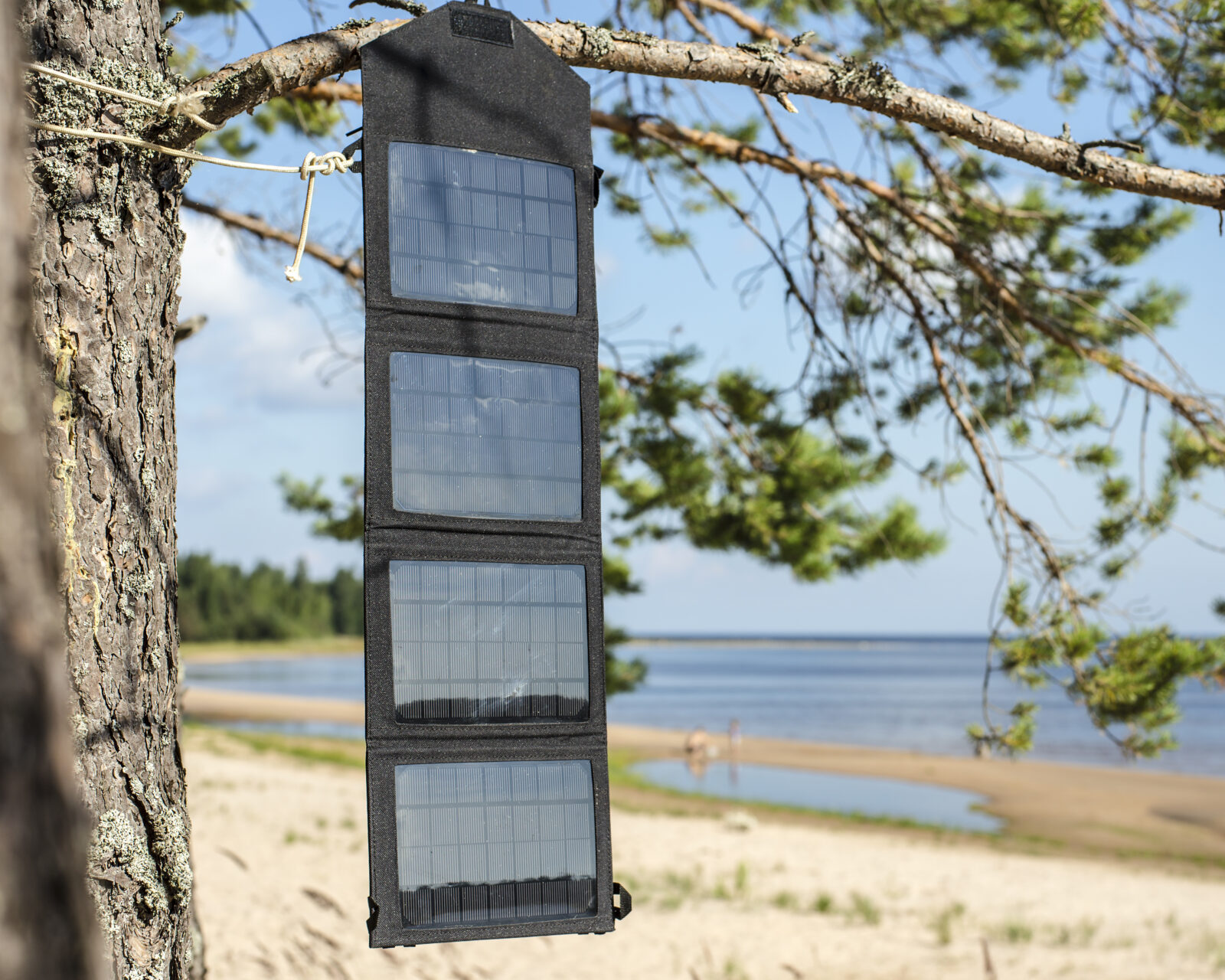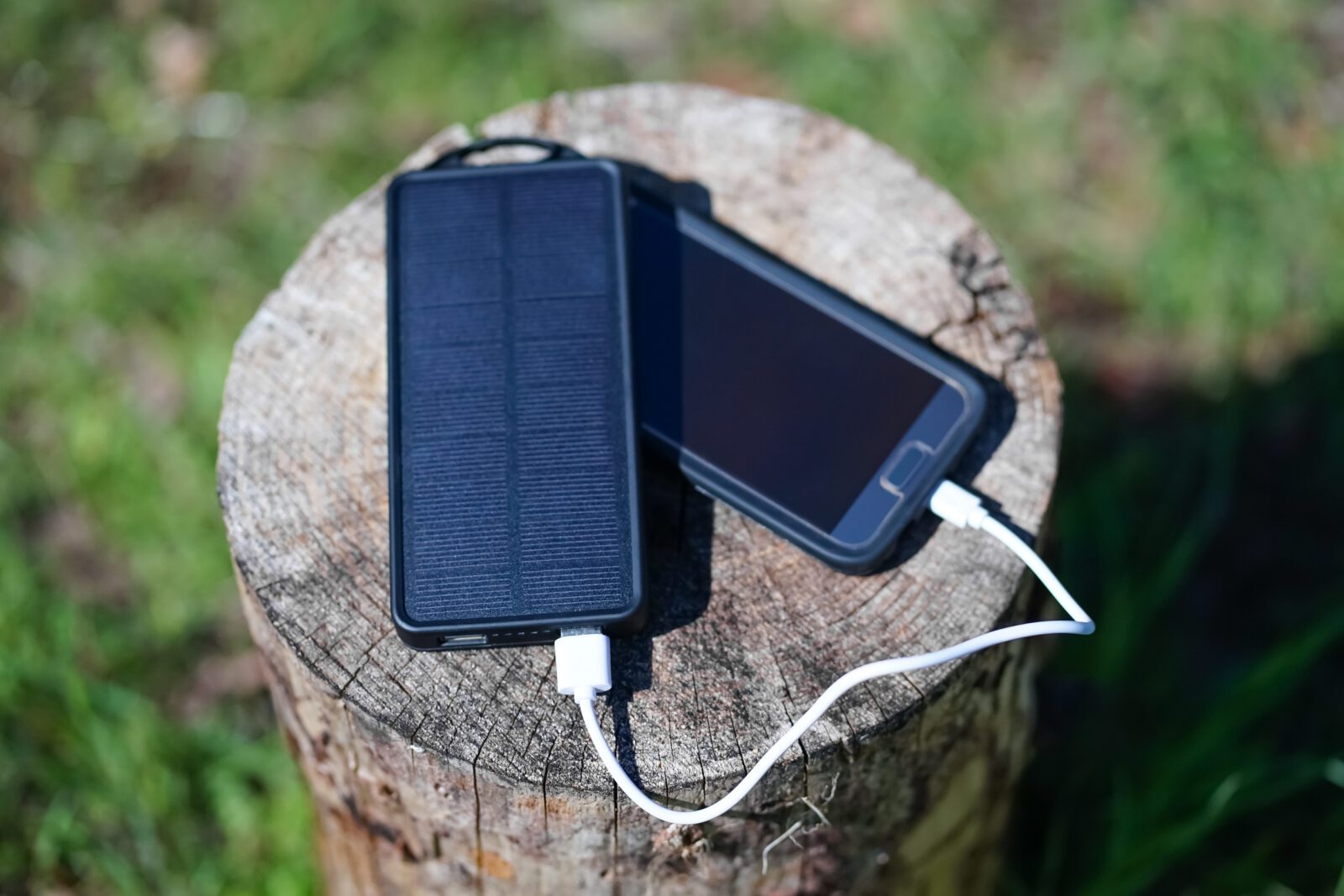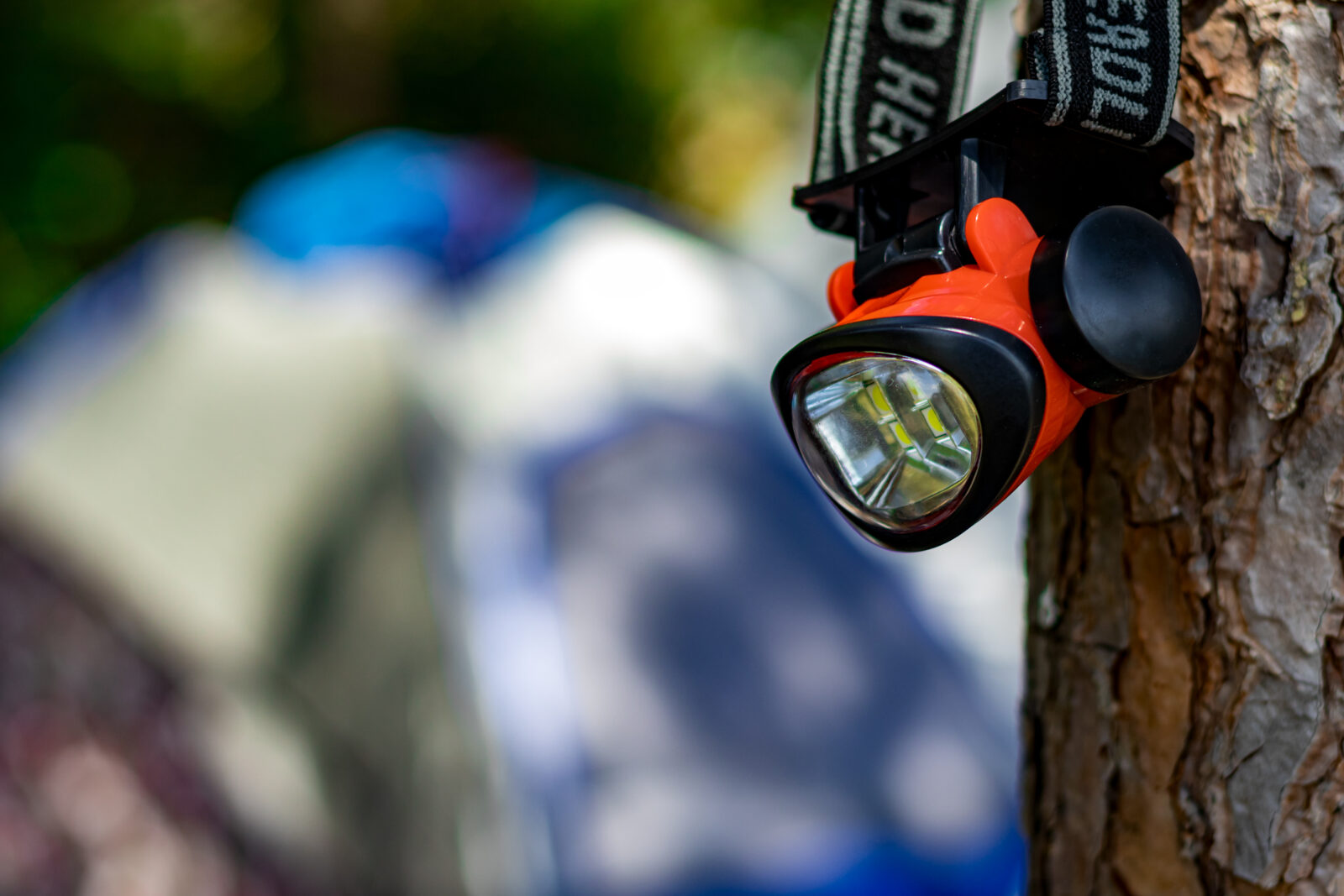After a new portable generator for camping?
We’re here to help.
Portable generators are complex pieces of gear. It can be difficult to find one that’s appropriate for your upcoming camping trip.
There are three features that make a great generator :
- Durable. They can withstand the harsh outdoor environment.
- Efficient. Should be able to run for hours without refueling or recharging.
- Easy to use. Intuitive design and start-up functions are a must.
To ensure that you get the ideal one for your needs, we curated the best models available on the market.
Our top portable camping generator picks
| Model | Power | Outlets | Weight |
|---|---|---|---|
| Jackery Explorer 240 | 400W | 1 AC, 12V DC, 2 USB | 6.6lbs / 3.0kg |
| WEN 56203i | 1,700W | 1 AC, 12V DC, 2 USB | 39.0lbs / 17.7kg |
| Champion 4000W | 3,500W | 2 AC, 12V DC, 2 USB | 81.6lbs / 37.0kg |
| A-iPower SUA12000ED | 9,000W | 6 AC, 12V DC | 275.0lbs / 124.7kg |
| DuroMax XP10000E | 8,000W | 4 AC, 12V DC | 260.0lbs / 117.9kg |
| Briggs & Stratton P3000 | 2,600W | 2 AC, 12V DC, 2 USB | 97.0lbs / 44.0kg |
| Westinghouse WH2200iXLT | 1,800W | 2 AC, 12V DC | 43.0lbs / 19.5kg |
| Westinghouse WGen 7500DF | 7,500W | 3 AC, 12V DC, 2 USB | 192.0lbs / 87.1kg |
| Goal Zero Yeti 400 | 300W | 2 AC, 12V DC, 2 USB | 29.0lbs / 13.2kg |
Jackery Explorer 240
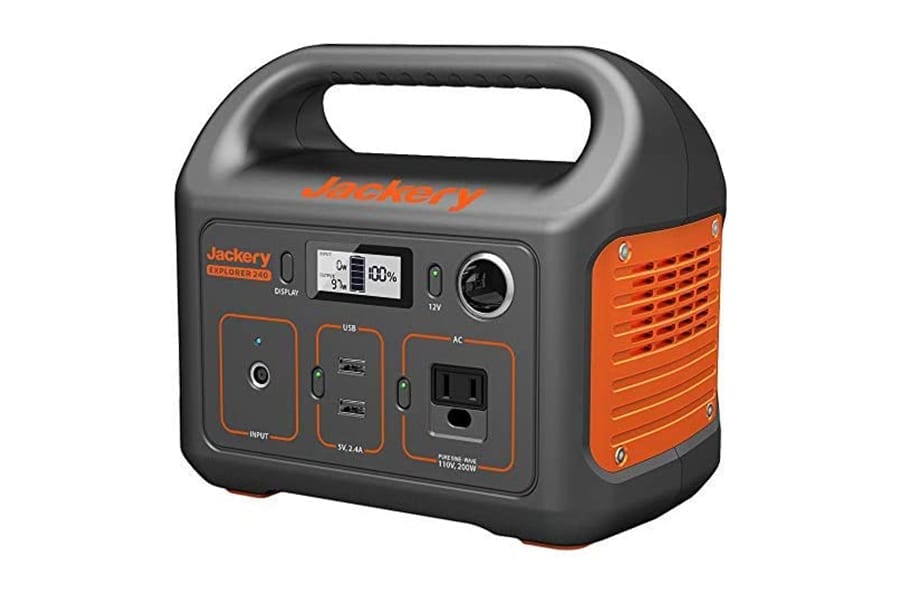
- Power : 400 watts
- Fuel Source : Solar
- Outlets : 1 AC, 12V DC, 2 USB
- Weight : 6.6lbs / 3.0kg
The Jackery Explorer 240 is a budget-friendly option for campers that want a simple generator for small electronics. It features a 240Wh (16.8Ah) lithium rechargeable battery that can be powered by an AC wall outlet, 12V car outlet, or a 60W solar panel (sold separately).
At just 6.6lbs (3kg) it is one of the lightest options on the market today. It also comes with a large built-in carry handle for easier transport between your vehicle and your campsite.
For ease of use, this generator has an LCD display screen that provides detailed information about charging status and power usage. It can be used to power your small electronic devices and even a mini-fridge using its multiple outlets, which include 2 USB ports.
Plus, the Jackery Explorer 240 portable power station can charge a smartphone up to 17 times.
What we like
- Highly affordable especially for a solar generator.
- Compact. Weighs 6.6lbs (3kg) and has a large carry handle.
- Multiple charging options. Can be powered by AC, 12V, or solar.
What we don't like
- Low power. Appropriate for small electronics only.
WEN 56203i Inverter Generator
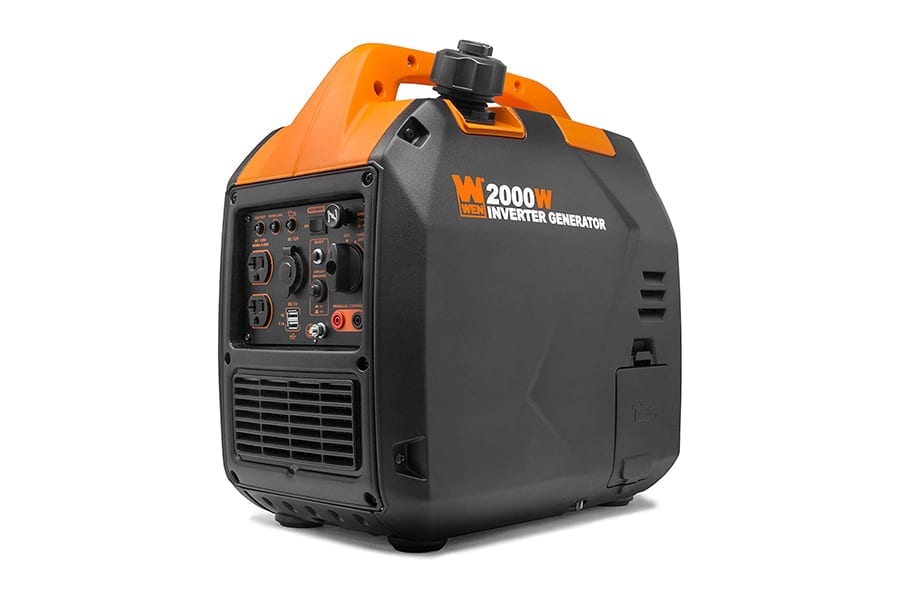
- Power : 1,700 watts
- Fuel Source : Gas
- Outlets : 1 AC, 12V DC, 2 USB
- Weight : 39.0lbs / 17.7kg
If you’re looking for a generator that’s compact and lightweight, the WEN 56203i might be a good option. Tipping the scales at only 39lbs (17.7kg), it’s one of the lightest models on the market.
Featuring a 79cc 4-stroke OHV engine, this model runs at just 51 dBA, making it quieter than a window-mounted air conditioner. It produces 1,700 running watts (2,000 watts starting), which is enough to safely power small electronics, but not refrigerators or power tools.
The WEN 56203i portable generator has an eco-mode that saves fuel by adjusting power outages to match the number of items plugged into its outlets. It also has both low-oil and low-fuel shut-offs, as well as built-in surge protection to protect your sensitive electronics and the generator from inadvertent damage.
What we like
- Lightweight. Weighs in at just 39lbs (17.7kg).
- Safety features. Includes surge, low-oil, and low-fuel shut-offs.
- Fuel efficient. Has eco-mode to better manage fuel consumption.
What we don't like
- Low watts. Best for smaller electronics.
Champion 4000W Open Frame Inverter
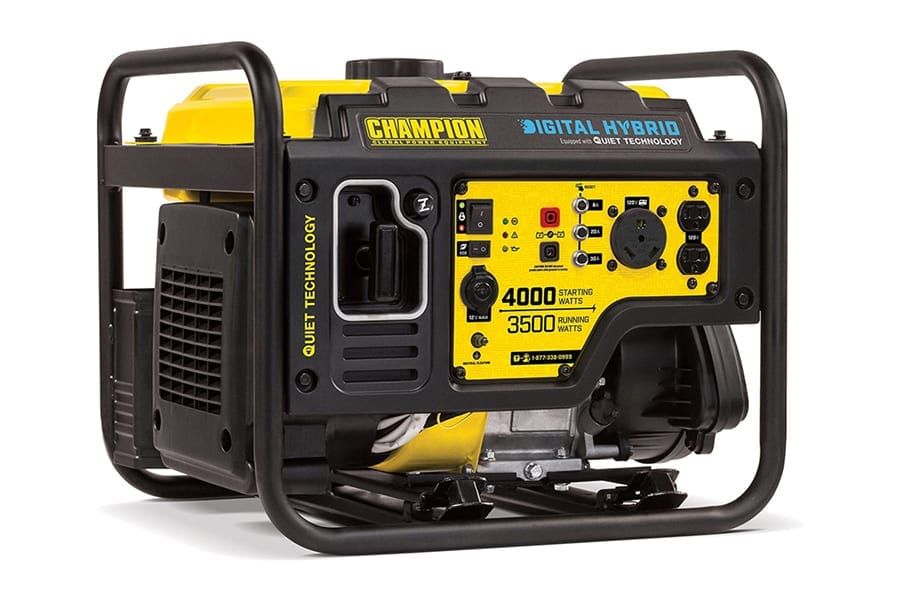
- Power : 3,500 watts
- Fuel source : Gas
- Outlets : 2 AC, 12V DC, 2 USB
- Weight : 81.6lbs / 37.0kg
As one of the most powerful in its class, the Champion 4000W Open Frame Inverter generator is designed to provide you with a constant stream of energy while camping. Its 224cc Champion engine can produce 3,500 running watts (4,000 peak watts) and can operate for up to 17 hours off of 2.9 gallons (11L) of fuel.
This generator comes complete with a Quick Touch Panel system that allows you to quickly change the engine’s settings. It can also be placed in Economy Mode to provide you with a better fuel economy when you’re running low on gas while camping.
Even though it has a powerful engine, this model is relatively quiet for a 3,500W generator. With an average sound output of 64 dBA, it is slightly louder than normal human speech.
To round it all off, the Champion 4000W Open Frame Inverter comes with 2 AC, 1 12V DC, and 2 USB outlets. It also has battery-charging cables to jump-start a battery in a pinch.
What we like
- Powerful. 224cc engine produces a lot of energy.
- Fuel-efficient settings allow for reduced gas consumption.
- Battery charging cables for jump-starting a vehicle.
What we don't like
- Heavy and doesn’t have wheels or great handles.
A-iPower SUA12000ED Dual Fuel Generator
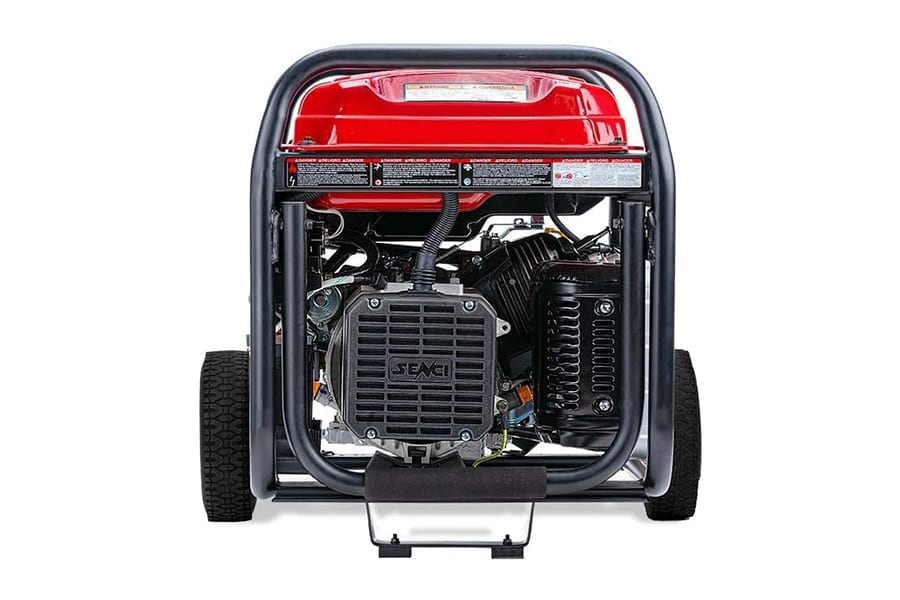
- Power : 9,000 watts
- Fuel Source : Gas / Propane
- Outlets : 6 AC, 12V DC
- Weight : 275.0lbs / 124.7kg
The A-iPower SUA12000ED is a great option for campers that want maximum versatility in their power source. Designed to run off of either propane or gasoline, this generator allows you to seamlessly change between the two fuel sources to power your electronics.
This generator’s 459cc OHV engine has the power to produce up to 9,000 running watts (12,000 starting), which is enough to operate nearly any appliance you might have in a camper at the same time. It also features an impressive 6 AC outlets and a single 12V DC outlet.
For ease of use, the A-iPower SUA12000ED dual fuel portable generator has an electric start system with an included battery.
Finally, this model comes complete with voltage regulators and weatherproof covers to prevent damage to its circuit breakers and switches.
What we like
- Burly engine can power all appliances for RV camping.
- Electric start. Features push-button start system for ease of use.
- Weatherproof cover on the circuit breaker to prevent damage
What we don't like
- Very Heavy. Gross weight of 275lbs (124.7kg).
DuroMax XP10000E
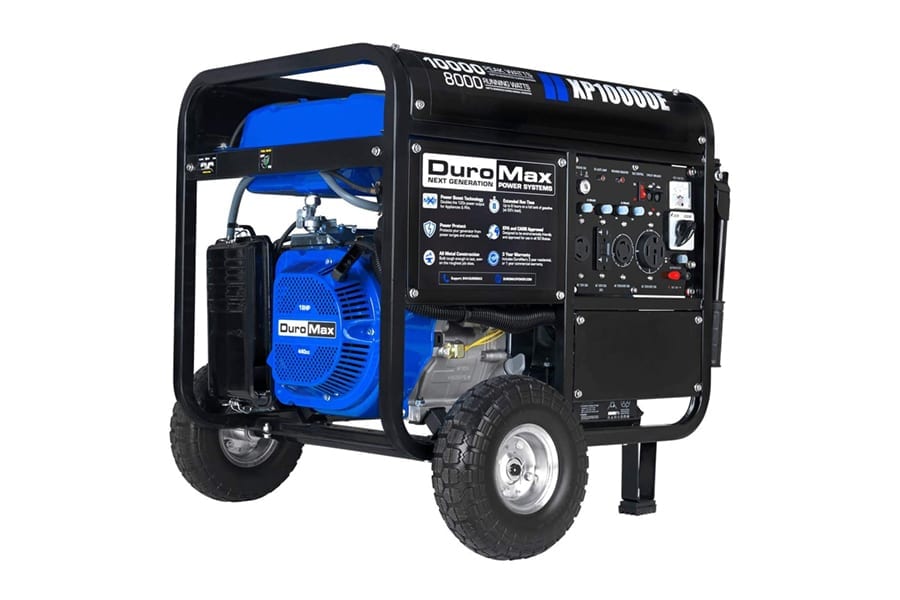
- Power : 8,000 watts
- Fuel Source : Gas
- Outlets : 4 AC, 12V DC
- Weight : 260.0lbs / 117.9kg
Made to power everything in your camper, the DuroMax XP10000E is a do-anything electrical source for outdoor enthusiasts. DuroMax’s 440cc OHV engine can produce 8000 running watts (10000 starting), which is enough to run a refrigerator or air conditioning unit inside your RV or camper van.
However, this generator was also designed with idle control technology, which lowers the RPMs of the engine to save fuel and reduce noise. It also has a built-in surge protector to prevent power surges from damaging the generator or your devices and low oil shutoff technology to save your engine when oil levels are low.
At 260lbs (117.9kg), the DuroMax XP10000E portable generator is by no means lightweight. But, it does come with two burly wheels for easier transport to and from your vehicle while camping.
What we like
- Surge protector. Prevents damage from power surges.
- Durable. Features all-metal construction for ruggedness.
- Very powerful. Can run a refrigerator or air conditioner.
What we don't like
- Expensive for a portable generator.
- Very heavy. Weighs 260lbs (117.9kg).
Briggs & Stratton P3000 Generator
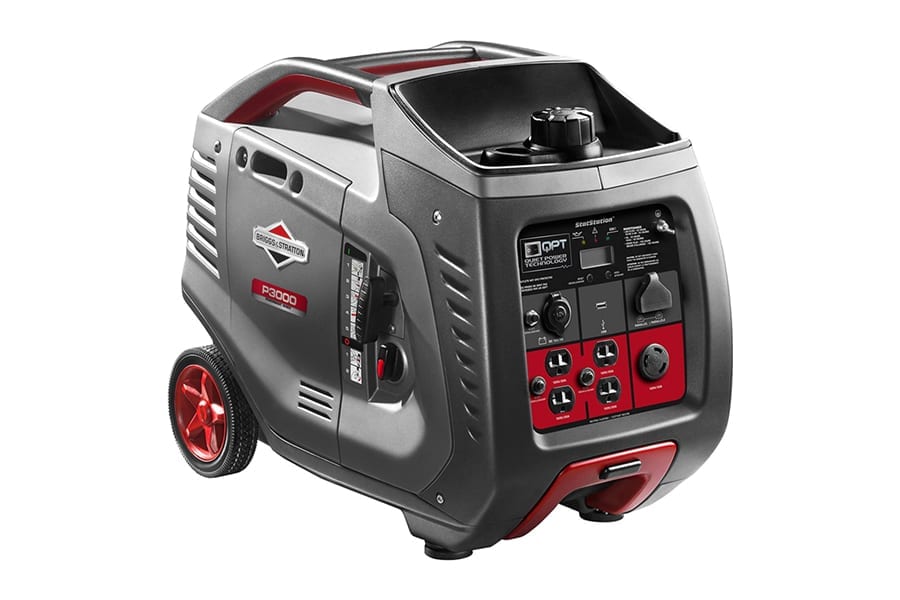
- Power : 2,600 watts
- Fuel Source : Gas
- Outlets : 2 AC, 12V DC, 2 USB
- Weight : 97.0lbs / 44.0kg
Designed specifically with user-friendliness in mind, the Briggs & Stratton P3000 generator is a burly power source for camping trips. It boasts an LCD StatStation display that makes it easy to keep track of power use and generator maintenance.
Although it’s a bit heavy at 97lbs (44kg), this model comes with twin cushioned carry handles for portability. It also has two wheels and a retractable pull handle for rolling on the pavement to and from the car.
With 2,600 running watts (3,000 starting) of power, this generator can accommodate up to 5 devices at once in its 2 AC, 1 12V, and 2 USB outlets. It can also run for 10 hours using just a single 1.5 gallon (5.7L) tank of gas.
Additionally, the Briggs & Stratton P3000 generator produces 58 dBA of noise, which is fairly low by portable generator standards.
What we like
- Intuitive. Includes LCD display for performance monitoring.
- Quiet. Runs at only 58 dBA.
- Wheels included for easier transport.
What we don't like
- Heavy. Weighs 97lbs (44kg), which is heavy for its size.
- Expensive compared to similar watt models.
Westinghouse WH2200iXLT
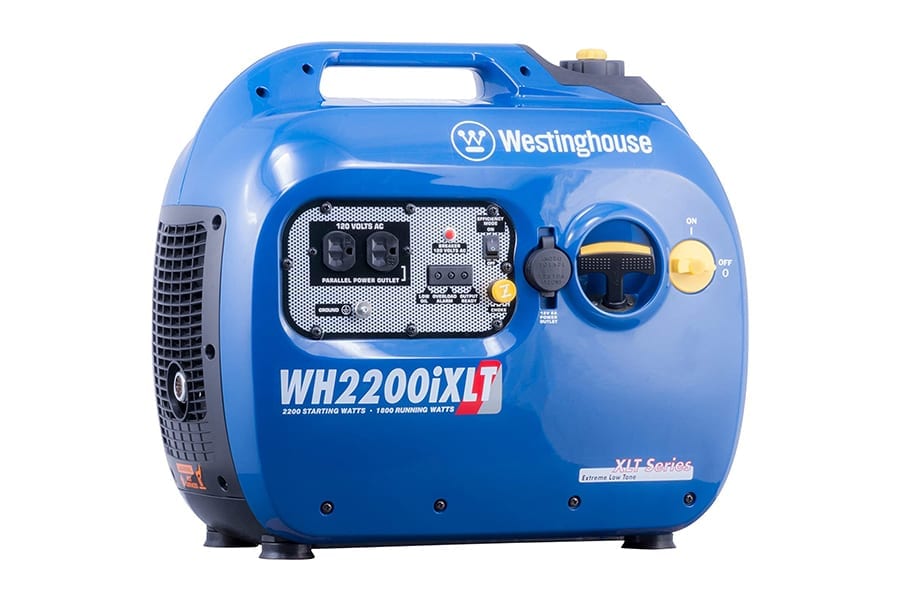
- Power : 1,800 watts
- Fuel Source : Gas
- Outlets : 2 AC, 12V DC
- Weight : 43.0lbs / 19.5kg
Reliable and dependable, the Westinghouse WH2200iXLT is a good choice for campers that prioritize portability. This model weighs just 43lbs (19.5kg) and has a built-in carry handle for easier transport to and from the car.
One of the best features of this model is that it produces little noise when running. With an operating noise level rating of just 52 dBA, it is quieter than most conversations.
This generator comes packed with a 79cc 4-stroke engine that produces 1,800 running watts (2,200 starting). It features 2 AC outlets and 1 12V DC outlet so you have options when it comes to powering your electronics.
Finally, the Westinghouse WH2200iXLT portable generator can run for up to 13 hours on a single 1.3 gallon (4.9L) gas tank, making it a fuel-efficient option for camping trips.
What we like
- Quiet. Just 52 dBA when running.
- Efficient. Runs for 13 hours on one tank of gas.
- Two outlet options for plugging in electronics.
What we don't like
- No USB port for directly charging devices.
Westinghouse WGen 7500DF
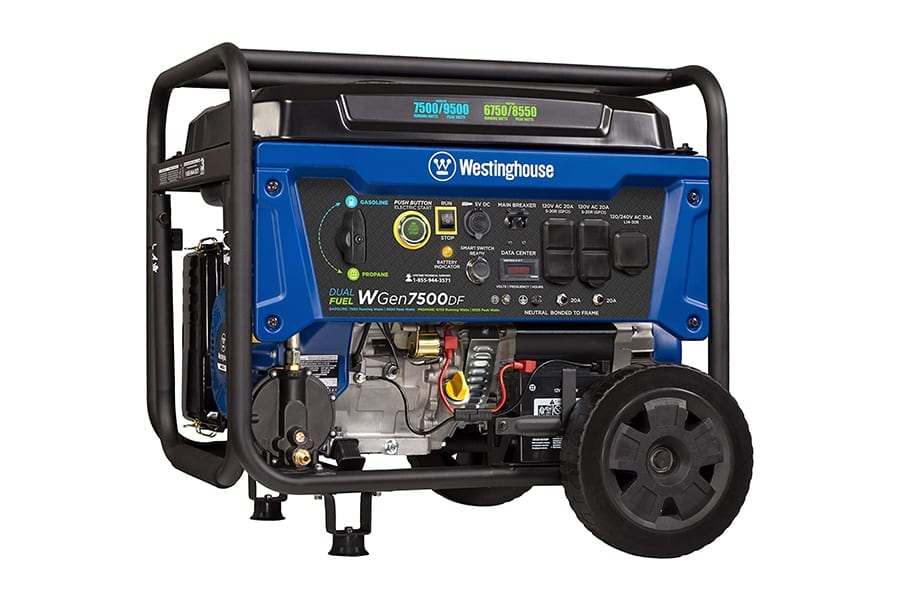
- Power : 7,500 watts
- Fuel Source : Dual
- Outlets : 3 AC, 12V DC, 2 USB
- Weight : 192.0lbs / 87.1kg
Rugged and powerful, the Westinghouse WGen 7500DF is a no-hassle option for campers who value simplicity. Its hardened steel frame is also durable enough to withstand the rigors of frequent outdoor adventures.
Built with a 420cc 4-stroke OHV engine, it can produce up to 7,500 running watts (9,500 starting) of energy. It includes an assortment of outlets including 3 AC, 1 12V DC, and 2 USB ports for powering nearly any electronic item.
One of the coolest features of the Westinghouse WGen 7500DF portable generator is its battery-powered start system. In addition to a single push-button ignition, the generator can also be turned on remotely using the included key fob.
That way, you can instantly start up your power without leaving your camper should you need electricity in the middle of the night.
What we like
- Push button start. Battery start system for ease of use.
- Wireless start. Includes key fob for remote start.
- Durable. Built with a hardened-steel frame.
What we don't like
- Pricey for a generator under 10,000 watts.
- Low fuel economy on gasoline power.
Goal Zero Yeti 400
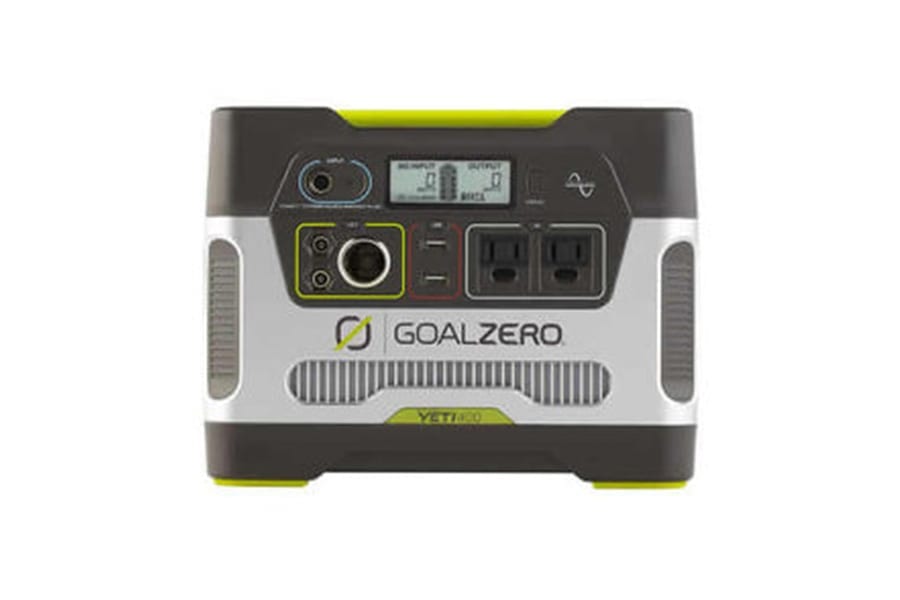
- Power : 300 watts
- Fuel Source : Solar
- Outlets : 2 AC, 12V DC, 2 USB
- Weight : 29.0lbs / 13.2kg
Portable, yet powerful, the Goal Zero Yeti 400 is a fully-featured sustainable power source for camping and van life. Its battery can be recharged hundreds of times and can reach full capacity in just 3-6 hours with the Boulder 200 Solar Panel (sold separately).
For added convenience, Goal Zero designed this generator with 2 AC, 1 12V DC, and 2 USB outlets that can power all of your devices. On a single charge, this model can power a mini fridge for up to 7 hours or recharge a smartphone over 20 times.
One of the best features of the Goal Zero Yeti 400 solar power generator is its versatility. It can easily be linked up to other Goal Zero generators or attached to a chain of solar panels to more efficiently charge your devices while outside.
What we like
- Long battery life. 20+ smartphone recharges on one battery.
- Versatile. Can be linked with other generators and solar panels.
- Quick charging. Fully charged in 3-6 hours using solar power.
What we don't like
- Expensive for a solar generator this size.
Camping Generators Buying Guide
With so many different kinds of camping generators out there, it’s vital that you know what to look for when deciding on the right model for your needs.
These are the 6 most important things to know before you start shopping.
Type of fuel used
There are four main types of fuel that can be used to power a camping generator.
Here’s what you need to know about them before you head outside.
- Gas-powered generators, like the Westinghouse WH2200iXLT, are popular because they provide better fuel efficiency than their propane-powered counterparts. However, they are generally heavier and bulkier than solar models.
- Propane generators aren’t as common because propane on its own is not as efficient as gasoline at powering a large engine. However, propane is a convenient power source because you simply need to hook up a 20lbs fuel tank to your generator to get it started.
- Dual generators, such as the A-iPower SUA12000ED provide all the benefits of both propane and gas generators in a single package, giving you the flexibility you need when you’re outside. The downside is that they tend to be more expensive. But, if you’re looking for a model that’s versatile enough for any adventure, a dual-fuel generator is hard to top.
- Solar generators are a solid choice for campers that are environmentally-minded or are interested in going further off-grid. While solar generators, including the Jackery Explorer 240, can be linked up to 60W solar panels, it’s important to note that panels are generally sold separately. Plus, you can often charge these generators at home using an AC outlet or in your car’s 12V outlet if you need a bit of extra power on a cloudy day.
Power usage requirements
When selecting a camping generator, it’s essential that you choose a model that’s compatible with your power needs.
For example, if you’re looking to run your RV’s air conditioning off your generator, you’re going to need one that provides a suitably large amount of energy output.
While every electronic device requires a different amount of energy output, here are some rough guidelines for what you should expect :
- Refrigerator : 2,200 starting watts / 700 running watts
- RV air conditioners : 1,700+ starting watts / 600 running watts
- Smartphone : 6 watts
- Laptop : 30 watts
- LCD TV : 50 to 100 watts
However, it’s important to keep in mind that these wattage guidelines are a minimum for what you’d need to power these devices.
Additionally, if you want to plug in more than one device at the same time, you’ll need a generator, like the Westinghouse WGen 7500DF to do the job.
Meanwhile, the Champion 4000W Open Frame Inverter would be best for campers that only want to power their AC or their refrigerator, but not both at once.
Finally, the elevation of your campsite will also affect the power output you get.
As a general rule, you can expect to lose 10% of the watt output of your generator for every 3,000 feet (914m) of elevation you gain above sea level.
Thus, a 10,000 watt generator at 3,000 feet (914m) would produce 9,000 watts of power.
Read More : How to Camp Safely in High Altitude Locations
Number of power outlets
If you’re looking to power a number of different devices at once, you’ll need a generator that comes with multiple outlets. Models such as the Briggs & Stratton P3000 and the DuroMax XP10000E are both solid options for campers that need a lot of power outlets.
With that in mind, the type of outlets is just as important as the number that you have. While some generators boast a lot of outlet options, if you need a 12V DC outlet and only have AC outlets available, then you’re out of luck.
So, before you buy, consider what kinds of power outlets you’re likely to need. That way, you can avoid disappointment and frustration down the line.
Noise levels
Traditionally, generators were pretty noisy.
While most portable generators still emit a decent amount of sound, new noise-reducing technology has helped make campgrounds around the world a whole lot quieter.
Even though gas, propane, and dual generators tend to be the noisiest options, there are quiet models available. For example, the WEN 56203i produces just 51 dBA of noise, which is about as quiet as a conversation.
If you want a completely silent generator, you’ll have to opt for a solar-powered model. Generators like the Goal Zero Yeti 400 emit no noise whatsoever because they don’t have an engine.
Read More : How to Quiet A Generator During Camping
Size and portability
Even if you plan to keep your generator pretty close to your car, you’ll have to lift it up and out of your vehicle to place it on the ground. Therefore, it’s helpful if your generator is light and portable enough to make the transportation process as seamless as possible.
For the most part, solar-powered generators tend to be the lightest and most compact options. This is because they don’t have an engine, which is traditionally the heaviest part of any generator.
On the other hand, if your top priority is portability but you still want a gas, propane, or dual generator, you’ll want to opt for a model that weighs less than about 100lbs (45.4kg). Wheels are also a helpful feature if you plan to stick to developed campgrounds with lots of pavement.
Keep in mind that lighter and more compact generators are almost always less powerful. So, there’s a bit of a trade-off here between power output and portability when buying a camping generator.
Warranty
Although you hope that your new generator won’t fail on you in the middle of a trip, it’s nice to know that you’re covered should something break.
Generator warranties vary quite a bit throughout the industry, though the standard is about 3 years for a gas, propane, or diesel generator and 2 years for a solar model.
Read More : The Best Time of the Year to Buy Discounted Camping Gears
FAQ
Can I run the portable generator in the rain?
You can run a portable generator in the rain if you can ensure that it won’t get wet. There are commercially-made generator tent canopies available for this purpose.
How to ground a portable generator at the campsite?
To ground a portable generator, you’ll need to hammer in a copper rod (about 4ft/1.2m long) into the ground. Then, connect it to the generator’s grounding bolt using a copper wire to complete the grounding process.
What is the lifespan of a portable generator?
Most portable generators usually last for 2,000 to 3,000 hours. 3,000 hours may not sound like much, but it’s equivalent to about 210,000 miles (337,960km) on a car engine.
How do I make the generator quieter?
The simplest way to make a generator quieter is to make an enclosure box (with a small exhaust vent) from plywood or drywall to absorb the sound. This box can be lined with mass loaded vinyl for extra soundproofing.
Gaby Pilson
Gaby is a professional mountain guide with a master’s degree in outdoor education. She works primarily in the polar regions as an expedition guide, though she can be found hiking, climbing, skiing, sailing, or paddling in some of the world’s most amazing places when not at work.
